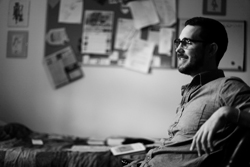MATT RADER
The Rusty Toque | Issue 3 | Fiction | October 12, 2012
YOU HAVE TO THINK OF ME WHAT YOU THINK OF MEWhat I didn’t say: I was awakened later that night by your face, tender and humiliated in those moments after I hit you. When I pushed back the currents to see who was shouting in the front yard and what harm was happening between men and women in the neighbourhood, there you were in your cracked black boots and wool skirt about to cross the street going away from me. Even in the night it was day and the maples and the birch were losing their leaves in a party all over the sidewalk. I wanted to go to that party. You looked up and down the street. Your bag sported colourful embroidery and I could tell the trees were jealous.
I opened the window and called after you saying, “I’d like to read you a poem about fire and Billie Holiday and my life, which is another man’s life in the poem, but that doesn’t matter.” Then I said, “Please, wait up!” This wasn’t a dream. You were in bed next to me. I heard a woman shout and it brought me all the way out of my sleep and everything I am telling you happened in the moments after I hit you while we made love. I hit you in the face in a pique of surprise and passion. “Don’t hold back,” you’d said. After a tear peeked out the corner of your eye and frightened me, I turned away and covered myself in sleep. It was morning and I was reading you a poem. I’d had a shower and dressed and you were still in bed wearing your glasses so you could use your phone to message someone who was not there with us because this is the bias of phones which love people best who are at a distance. I didn’t say anything. I started reading you a poem about a man who had been banished, like Billie Holiday, from New York City, but whose life had been longer and somewhat less humiliating than hers. In the poem, the man is interrogated by fire. He’s a lot like me and the poem was a lot like us with the admission that he was in fact married to another woman at the time and how the woman who had banished him, who was not his wife, was wearing only an “apricot tinted, fraying chemise” which is something I feel you must have owned and perhaps still do. “You have to think of me what you think of me,” is what he says to us, his silent interlocutors, but I couldn’t bring myself to say this to you. You’d had enough of me going on about me. I don’t think you liked the poem and I don’t think you liked me reading it. You had your reasons. Which were fair, I guess. I hadn’t asked you if I could read it. I hadn’t asked exactly if I could hit you. What I didn’t tell you after reading the poem was that I’d been looking for that poem for many years and only just then, reading it to you in the pitiful light of that morning, did I recognize it as the poem I’d been looking for. Or rather, I’d been looking for an instance in a poem that I’d encountered somewhere in my past, but hadn’t, until that moment reading to you, been able to recall where I’d encountered it. Such coincidence—or irony—I’m never sure which—because the instance has to do with that discrete moment when a stranger, who is sad or puzzled or deeply hurt, looks out from the eyes of the woman you are trying to love even as she laughs with you or kisses your hand or takes you slowly in her mouth. “Irony is reflection in the second degree,” you said because I put it in your mouth. “When you see yourself seeing yourself.” “Would it make a difference if I left?” I said. “What if I had gotten up and had a shower?” you said. It was a fair question. “What do you make of a man,” I said, “who writes down all the true things in his life and asks everyone to pretend with him that none of it happened, none of it is real?” But I was talking about me again. What I didn’t say: why I hit you, what possessed me, tell me about yourself. “There’s always such mystery in other people,” you said, “and I guess in ourselves too. Things can change very quickly.” Your eyes were clear and you were putting on your skirt and black boots and your bag, embroidered with leaves, was over your shoulder. |
MATT RADER is the author of three collections of poetry, most recently, A Doctor Pedalled Her Bicycle Over the River Arno. "You Have to Think of Me What You Think of Me" references Larry Levis' poem "My Life in a Late Style of Fire" from the collection Winter Stars. He lives in the Comox Valley on Vancouver Island. Website: http://mattrader.com


